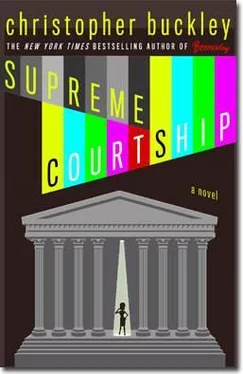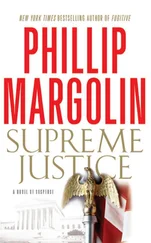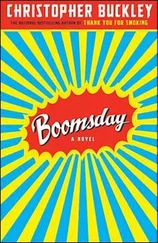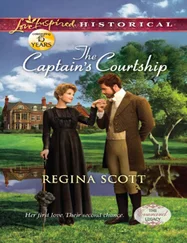
Christopher Buckley
Supreme Courtship
© 2008
Supreme Court Associate Justice J. Mortimer Brinnin’s deteriorating mental condition had been the subject of talk for some months now, but when he showed up for oral argument with his ears wrapped in aluminum foil, the consensus was that the time had finally come for him to retire. Thank God, his fellow justices agreed-unanimously, for once-cameras weren’t allowed in the Court.
Brinnin was a distinguished jurist who had cast some of the most consequential votes of his day. But the sun had now (emphatically) set on that day. His mind, once capable of quoting entire opinions as far back as the nineteenth century, in toto and verbatim, was now succumbing to medication (for persistent sciatica) and increasingly copious evening martinis. He had taken to summoning his clerks in the middle of the night to tell them that there were moray eels in the toilet. On another occasion, also at three a.m., he met them at the front door holding a bag of kitchen garbage and instructed them that they must get it to Omaha -without delay. (Justice Brinnin had grown up there.) It was when Justice Brinnin became convinced that the ghost of Oliver Wendell Holmes Jr. was whispering in his ears trying to influence his vote that he reached for the aluminum foil.
Chief Justice Declan Hardwether, who was himself going through a rough patch at the time, found the situation embarrassing. He was not by nature a confrontational man and so was at pains what to do. None of the other justices, who were, at any rate, hardly speaking to one another, wanted to intervene. So the CJ turned to the den-motherly Justice Paige Plympton.
“You’ve got to do something,” he pleaded, “before he shows up dressed like the Tin Man, singing ‘Somewhere Over the Rainbow.’ ”
Justice Plympton dealt with the situation with her usual grace and gentle persuasiveness. And when that didn’t work, she assembled Justice Brinnin’s children in a conference call intervention.
In due course, the Marshal of the Court hand-delivered Justice Brinnin’s letter of resignation to the White House. The news was duly announced. Nothing raises the national temperature more than a VACANCY sign hanging from the colonnaded front of the Supreme Court.
PRESIDENT VANDERDAMP was not at the time riding a tidal wave of popularity. His approval ratings were, in fact, abysmal, though his press secretary was always quick to stress that they were in “the high twenties.”
Donald P. Vanderdamp had been elected two and a half years ago in a three-way race that included a hedge-fund billionaire who spent $350 million of his own money. Vanderdamp squeaked across the finish line with two electoral votes to spare. He had run on a platform of “changing the way Washington does business.”
Everyone who runs for president says they are going to change the way Washington does business. The surprise was that Donald P. Vanderdamp, former Eagle Scout, naval officer, mayor, governor, affable, decent, churchgoing, family-oriented, golden retriever-owning midwesterner, actually meant it. He was sixty-four years old and, as one waspish pundit put it, “fast approaching retirement age, and not a minute too soon.” He was physically unremarkable in an Eisenhowerish sort of way: balding, trim, pleasant-looking but with the quietly commanding look of, say, an airline pilot or high school principal. Some people fill a room. Not Donald P. Vanderdamp. His blandness-what another pundit had called his “ineffable Donald-ness”-had served him well over the years. It invited underestimation. People tittered at his great passion and hobby-bowling.
Faced with a national debt mind-boggling even by Washington standards, Donald P. Vanderdamp had rolled up his shirtsleeves on his first day in office, unscrewed the cap of the presidential veto pen, and gone to work. He wrote No on every spending bill that the Congress sent to his desk.
He was determined to bring order to the nation’s books. So far, he had vetoed 185 spending bills, acquiring the nickname “Don Veto.” It was an incongruent term, given his total lack of Italianate qualities. Donald P. Vanderdamp was paradigmatically nonethnic, as middle American as sliced white bread. (Excellent with peanut butter and jelly but not much else.) But as Don Veto he had evolved into the sworn enemy of the majority of the United States Congress, whose members understand that their main job, their highest calling, their truest democratic function, is to take money from other states and funnel it to their own. What greater homage to the Founding Fathers and the men who froze at Valley Forge could there be than a civic center in Tulsa paid for by the taxpayers of Massachusetts?
Nominating someone to the Supreme Court can be hard enough for a popular president. For one at the opposite end of the likability spectrum, it presents a daunting challenge, as well as a delicious opportunity for the chief bouncer at the rope line in front of the Supreme Court entryway: the chairman of the Senate Judiciary Committee.
The current occupant of that powerful chair was a man named Dexter Mitchell, senator from the great state of Connecticut. Dexter Mitchell despised Donald P. Vanderdamp, though he was always careful, in his public statements, to say that he had “the greatest respect” for him. He despised him for a variety- or as they say in Washington, “multiplicity”-of reasons. He despised him because he had vetoed S. 322, a bill Mitchell had sponsored that would have required every helicopter rotor blade in the U.S. military to be made in his home state of Connecticut. And he despised Donald P. Vanderdamp for ignoring his suggestion that he appoint him to fill the Brinnin vacancy on the high court. (More about that in due course.)
President Vanderdamp’s first nominee to succeed Brinnin was a distinguished appellate judge named Cooney. Enormous care had gone into his selection, knowing that Senator Mitchell’s Judiciary Committee was preparing an auto-da-fé that would have made the Spanish Inquisition blush. Cooney was a jurist of impeccable credentials. Indeed, he seemed to have been put on earth precisely for the purpose of one day becoming a justice of the United States Supreme Court.
Senator Mitchell’s Judiciary Committee staff investigators were known on Capitol Hill as the Wraith Riders, after the relentless, spectral, horse-mounted pursuers of hobbits in The Lord of the Rings. It was said in hushed tones on Capitol Hill that the Wraith Riders could find something on anyone: could make it look like Mother Teresa had run a whorehouse in Calcutta; that St. Thomas More had been having it off with Catherine of Aragon; or that Dr. Albert Schweitzer had conducted ghastly live medical experiments on helpless, unanesthetized African children on behalf of Belgian drug companies.
However, faced with the blemishless Judge Cooney, the Wraith Riders were left to whinny there was nothing with which to hang him, not even an unpaid parking ticket. He was an exemplar of every judicial virtue. Not one of his decisions had been overturned by a higher court. As for his personal life, he was so reasonable and wise that he made Socrates sound like a raving, bipolar crank.
Dig deeper, Senator Mitchell told the Wraith Riders. Or dig your own graves. Off they rode, shrieking.
And so, on day two of the Cooney hearings, Senator Mitchell, smiling pleasantly as usual, began: “Judge Cooney, you are, I take it, familiar with the film To Kill a Mockingbird?”
Judge Cooney answered yes, he was pretty sure he’d seen it, back in grade school.
Читать дальше












